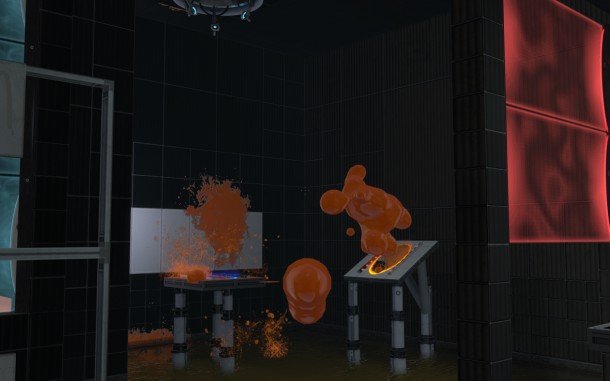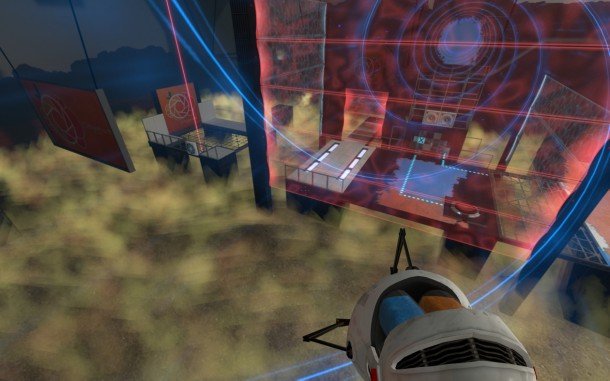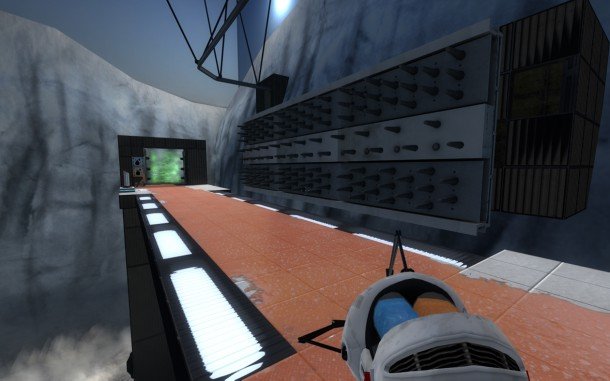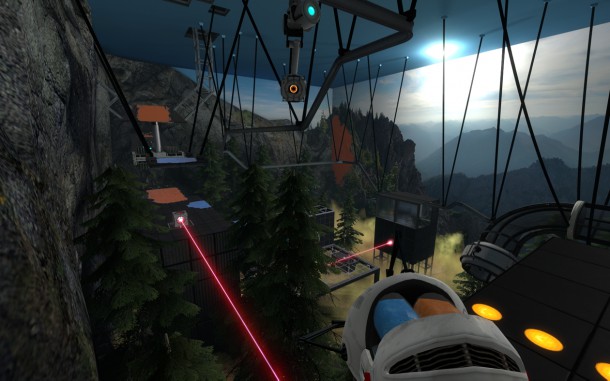Our Verdict
Lacks balance and grows repetitive, but provides a handful of good puzzle chambers if you're willing to pay for them.
PC Gamer's got your back
Aperture Tag is a mod for Portal 2 that removes the portal gun and replaces it with one that fires gel: repulsion gel, which makes you bounce higher, and propulsion gel, which makes you move faster. Jumping and running, in other words, replaces portals as the main tools to solve puzzles with. Unfortunately, there's no replacement for Portal 2's other elements, like enjoyable voice acting, excellent writing, and a well-balanced level of challenge. And, unlike most mods, Aperture Tag adds a price tag, meaning the first puzzle to solve is: should you pay for this?
There are just over two-dozen test chambers in Aperture Tag, though a couple are recycled from the original game, spiced up by having no portal gun to solve them with. The early game is slow to evolve, giving you only the repulsion gel to play with for a long while. I understand the modders wanting to ease me into the mechanics of the gels, but you can't play the mod without owning Portal 2, and if you own Portal 2, chances are you've played it and already know how everything works. A shorter refresher course would have been welcome.
Once both gels are unlocked, the game ramps up the complexity, though unevenly. I found a couple of early chambers surprisingly vexing while some endgame puzzles were so easily solved I felt like I'd missed something. Even when puzzles are good, they can be spoiled by poor design choices: in one chamber, I'd solved the room in my head but it still took a while to beat solely due to the way a faith plate-launched weighted cube landed, which seemed unfair. I'm happy to have my brain and reflexes tested, but not thrilled to have to repeat a sequence because a cube took a few bad bounces. A small handful of test chambers, however, are genuinely satisfying to solve, utilizing gels, blocks, buttons, mirror cubes, force fields, and yes, even portals (they do show up from time to time, but can't be placed by the player).

It ain't the paint
Repetition is an issue. One of the first tricks we learned playing with gels in Portal 2 was that laying down a line of speed gel and ending it with some bounce gel gives you an awesome, rocketing leap. Aperture Tag requires this on so many of its levels that it feels like a pointless added bit of work, as if the modders just ran out of gel-related challenges and kept reusing this initially enjoyable gimmick. Also, while it takes just a mouse-click to reposition a portal in the vanilla game, slathering walls and floors in paint takes time and isn't particularly fun to do repeatedly in the same chamber. This becomes a problem since the mod's later chambers almost exclusively feature toxic floors, meaning that missing a jump is punished by death, often undoing all your careful (or sloppy) painting and discouraging haphazard experimentation. That said, the auto-save system works pretty well, saving your game at multiple steps throughout some of the longer and more elaborate puzzles.

One nice addition is the "Fizzler," an energy field that switches one or both barrels of your paint gun on and off, and figuring out how to properly paint areas when your gun has been partially or completely disabled adds another level to the puzzle-solving. The mod could have used a few more new ideas like this. I was hopeful after spotting what looked like a new brand of sentry turret early on, but it didn't act any differently, and by the end of the game the turrets revert back to their original appearance—not to mention that with unlimited bouncy gel at your disposal, turrets are easily beaten. I didn't notice much in the way of custom art assets, either, and there's no real use of cinematic physics (such as Wheatley mashing enormous test-chambers together in Portal 2) meaning the mod is mostly a static series of connected test chambers, with one exception.
The centerpiece of the mod is a time-based speedrun that requires you to zoom down a series of twisting corridors and launch yourself off ramps at breakneck speed, projecting gel ahead of you to keep up your momentum and bounce at just the right times. While exciting and satisfying to beat, this sequence is hurt by the lack of preparation for it, featuring only one brief sequence of gel-racing earlier. Also, when you're rocketing along at top speed, the gel you're splattering ahead of yourself actually lags a bit behind, making it tough to tell if you're painting the landscape ahead properly. Even the modders seem to recognize this sequence is overly difficult: they've provided a big red button that lets you skip it entirely.

Several attempts at a story, misdirection, surprises, and humor are made, but all fall flat. The personality core leading you through the test chambers isn't exactly irritating, but his jokes certainly aren't funny, and apart from "generally upbeat" it's a struggle to even pin down what his personality is. I wasn't expecting anything approaching Valve's level of writing, story, or performance, but if a mod is going to include lots of talking, its character should have something more interesting to say.
This mod is for sale on Steam. I'm all for modders getting paid for their work, and clearly a lot went into this mod, but I'd say their price is a tad optimistic for what you get. In the Steam Workshop, there are a few hundred thousand custom test chambers to explore for free.
Details
Expect to pay: $7/£5
Release: Out now
Developer/Publisher: Aperture Tag Team
Link: http://bit.ly/1qkNvz7
For a breakdown of our review methodology, check out the PC Gamer reviews policy .
Lacks balance and grows repetitive, but provides a handful of good puzzle chambers if you're willing to pay for them.

Chris started playing PC games in the 1980s, started writing about them in the early 2000s, and (finally) started getting paid to write about them in the late 2000s. Following a few years as a regular freelancer, PC Gamer hired him in 2014, probably so he'd stop emailing them asking for more work. Chris has a love-hate relationship with survival games and an unhealthy fascination with the inner lives of NPCs. He's also a fan of offbeat simulation games, mods, and ignoring storylines in RPGs so he can make up his own.


